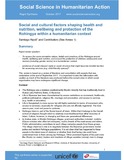Social and Cultural Factors Shaping Health and Nutrition, Wellbeing and Protection of the Rohingya within a Humanitarian Context
Abstract
The Rohingya are a stateless predominantly Muslim minority that has traditionally lived inArakan (aka Rakhine State), in Myanmar. Life in Myanmar has been characterised by severe restrictions on movement, livelihoods, political participation, religious life, marriage and procreation, and access to services. More than half a million Rohingya refugees, 60% of them children, have crossed the border into Bangladesh, joining refugee camps or settling informally, and are in dire need of basic services such as food, health care, and protection. To support their humanitarian intervention, UNICEF have requested this rapid evidence review: to assess the socio-normative values, beliefs and practices of the Rohingya around health, wellbeing and nutrition, and around the protection of children, adolescents and women (including gender norms) in a humanitarian context; and to assess the existence of social classes/ caste or social structures that might become invisible barriers for accessing services (e.g. child-friendly spaces)? To answer these questions, this paper first explores the broader context of Rohingya in Myanmar and Bangladesh; then it explores key religious and cultural practices that are relevant to issues of health and protection; the following section explores aspects of health in more detail such as sanitation, nutrition, maternal and mental health. Finally the report closes with a set of preliminary recommendations.

